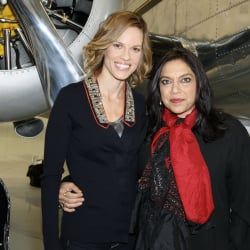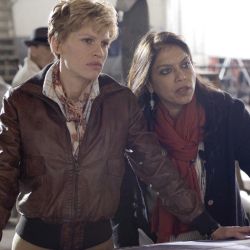Interview: Hilary Swank And Mira Nair On Female Power And Amelia

Historical figures like Amelia Earhart are hard to come by-- a woman who bucked the trends of her time by wearing pants and refusing to marry until her 30s, who wasn't just a pioneer in the field of aviation, but was committed to helping other women follow in her footsteps. Then again, directors like Mira Nair and actresses like Hilary Swank are hard to come by too. Nair is one of few female directors working consistently with big budgets and stars, while Swank has made her career playing tough women like Million Dollar Baby's Maggie Fitzgerald, or tackling tricky roles like Brandon Teena in Boys Don't Cry.
Suffice it to say that the pair were as excited as can be to tackle the iconoclastic Earhart, delving deep into her history and her psyche to present a portrait of the woman from the inside, not as a cultural figure but as a real person. A little over a week ago Nair and Swank arrived at an airfield in New Jersey, accompanied by the Electra airplane used in the film, to talk to press about their inspirations in making the film, the role of daredevilry in acting, and how women in power can help and support one another. Read below for a selection of their conversation with the press. Amelia is currently in theaters everywhere.
How did you build tension in the film when we know how it ends?
Hilary Swank: Well, you think you know how it ended. You have to go see it to see if really ends the way you think it ended. 'Cause there's a lot of theories, aren't there?
Mira Nair: Truth is much stranger than fiction and, often, much more powerful. And-- the ending, we have the records of the last transmissions. And nothing could be more dramatic or heartbreaking that that. Besides the fact that we know there is a mystery. I very systematically, with a lot of help from people here and my crew really staged very, very carefully and truthfully the actual transmissions. My work is also to create some sense of poetic power. And I imagined what it would be like, you know, as you see your fate in front of you.
? Hilary did what she does beautifully. And when we felt we had it, then I whispered some not so sweet nothings in her ear. And I said, "Let's just-- let's just fall apart now." Amelia was controlled, but could see what was happening to her. And then realizing it. And then it's, I hope, a certain visual drama that will take you to where she was.
Hilary Swank: Obviously, making a movie is a collaboration. And it takes a lot of people's ideas. But in the end, you know, I just tried to do what I was told and what was on the page. It's a big responsibility to play someone who really lived. We all have such a great idea of who she was and what she looked like. So, there wasn't a lot of room for fictional license. And we had to just do the best we could to do honor to that person.
CINEMABLEND NEWSLETTER
Your Daily Blend of Entertainment News
What was the research you did into Amelia's life? And Mira, as a director, what do you focus on with a life this big?
Hilary Swank: I learned about Amelia from a very young age, but what I learned is what you learn in textbooks. And so for me, obviously, getting under the skin of a person that I'm playing is really important. We're all specific human beings. There was lots of literature about Amelia. So reading all of that literature. Also, trying to understand who she was. I think Amelia was a very private person. So, you know, what she was expressing out in the world might not necessarily have been what her true thoughts were.
? I kind of expected from women to really wanna see this movie. But a lot of men are also coming up to me saying, "I can't wait to see this movie." And I think what people are, in my opinion, kind of, magnetized to is the idea this person, Amelia, who lived her life the way she wanted to live it. She made no apologies for saying, "This is my life. And this is how I see it. And this is how I want it to be done." It's obviously a period piece. Yet, it even transcends what we even know now. It was, certainly, a reminder for me to live my life-- you only have one life. And it's so short. I think Amelia was just such a great reminder that you can live your life the way you want it and find love and experience your dreams. And you can have it all.
Mira Nair: There is still a very interesting enigma about who Amelia really was. And we, kind of, used that in the film as well. For me, the real window on to understanding who she might have been was her own writings. And she wrote really, very interesting turn of phrase. She had simple, pithy, but really pretty contemporary ways of writing and speaking. You know, she wrote the first pre-nup, really, to George Putnam, who she resisted many, many times. And then she laid down her conditions. Which were very gracefully laid down. But they were very direct and very modern, you know? ?
Hilary, you took flying lessons, right? Can you talk about that?
Hilary Swank: Obviously, you can't play Amelia Earhart and not learn how to fly. That would just be wrong in every way. Learning how to fly, for me, was so euphoric. Because it was like I was learning how to ride a bike. It was a first. And, you know, it takes all of your senses. You are completely immersed. It's dangerous. It's adventurous. It's all of the things that I love and that I think Amelia loved. I'm not a big sweater. But I would find after a two hour flight lesson, I would land and my back was drenched, just from the concentration. It was really wonderful?
I would like to get my pilot's license. I like to see things through to the end. And I don't wanna just say, "Yeah, I flew." I'd like to continue to go up on my own. One of the great things about my job is I get to do all of these things that I may not experience had I not been an actor. And I think saying that I learned how to fly to play Amelia Earhart is pretty great.
Mira, you've said that Hilary brought a spiritual quality to the role. What do you mean by that, and what do you think she has in common with Amelia?

Mira Nair: When I said that she had this spiritual quality, I meant it. Besides all the accoutrements of the outside-- you know, getting her to look and all of that like Amelia/ But it's really from within, I felt, that her strength and also her daredevil quality. Hilary is completely a spiritual daredevil. And that's not something you can direct. With Hilary, it comes from within. Because she is someone who gets excited about, you know, just taking leaps and taking challenges and then mastering them.
? Is Amelia a role you've always wanted to play? And as a woman, how did you relate to her open marriage?
Hilary Swank: I wouldn't say I was always longing to play Amelia Earhart, but I do long to play roles that challenge me and scare me and make me learn new things about the world, about myself, about my art. I had read a script on Amelia about ten years ago, right after I did Boys Don't Cry, and it didn't capture Amelia to me. When this one came across my desk, I just felt that connection.
Amelia's way about living her life was very honest and very open. When she lived her life the way she wanted and the way she said she wanted to live it, she had already expressed that's how she was gonna do it. So, it wasn't like she was hurting anybody along the way. I respect anyone who is able to be so forthright about themselves.
Hilary, Uma Thurman has suggested you might get another Oscar for this role. What do you think about that?
Hilary Swank: Well, first, to have such a compliment from another actress that I admire so much is a great honor. You know, Amelia was so, I think, so supportive of other women. And women aren't always supportive of another woman's strengths. I think powerful women are supportive of the underdog woman or the women suffering from inequality, yet when it's another woman's strength, they find it hard to muster up a lot of accolades. So, one, it's very, very nice to hear such a nice compliment from someone that I admire so much.
? In my opinion, Mira being at the helm of this ship was such a perfect match because I think it's rare to see a woman carrying herself in the way in which you do. I think Mira also makes no apologies for her strengths. And it's interesting when you see a woman in a place of power, a lot of times, they're apologizing for it. So, to be with Mira and to see her ask for what she needs, to see her direct with the strength in which she carries herself and with the vision that she carries, I think, was perfect to direct a story about Amelia Earhart.
Mira, you're very successful in a field that doesn't have very many success stories for women. Can you talk about your role as a role model for other female directors?
Mira Nair: My first film was Salaam Bombay, about street kids in Bombay. It really directly impacted the government policy on street kids, and then, we set up the salaambalack (PH) trust which is a foundation for street kids. And now, 5,000 street kids and 17 centers later, 21 years of this is carrying on. So, this can sometimes happen with cinema and sometimes not. I mean, cinema is such a wide-ranging, entertaining, extremely powerful vehicle.
? When I made my second film, Mississippi Masala, I made it in Uganda and East Africa, and have since lived in Uganda for part of the year, and noticed over the 20 years I've lived there that there is very little of Africa on screen. The few times we see the stories of Africa, they are hardly every made by Africans. So we set up Maisha, which is a Swahili word which means life, to start our own film school in East Africa. It's a free school that gives scholarships to Rwandese, Kenyans, Tanzanians, and Ugandans. It's basically based on the principle that if we don't tell our own stories, no one else will. The idea is to tell our own stories, like Amelia did. One of the big reasons I said I wanted to make Amelia was because she had a dream, she pursued it, and she also had an incredible grace and responsibility to the world at the same time as she was pursuing her dream. And that's what I think, you know, art should do.
Staff Writer at CinemaBlend
Most Popular





